奥运户的起源(发源)与发展中英文版
奥运会历史英语作文
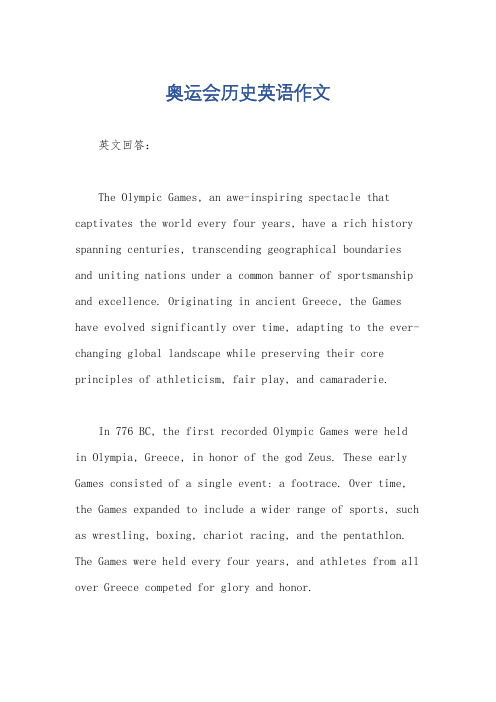
奥运会历史英语作文英文回答:The Olympic Games, an awe-inspiring spectacle that captivates the world every four years, have a rich history spanning centuries, transcending geographical boundaries and uniting nations under a common banner of sportsmanship and excellence. Originating in ancient Greece, the Games have evolved significantly over time, adapting to the ever-changing global landscape while preserving their core principles of athleticism, fair play, and camaraderie.In 776 BC, the first recorded Olympic Games were held in Olympia, Greece, in honor of the god Zeus. These early Games consisted of a single event: a footrace. Over time, the Games expanded to include a wider range of sports, such as wrestling, boxing, chariot racing, and the pentathlon. The Games were held every four years, and athletes from all over Greece competed for glory and honor.The Olympic Games were an integral part of Greek culture, and they played a significant role in the development of Greek society. The Games were a time for celebration and unity, and they provided a platform for athletes to showcase their skills and strength. The Games also served as a way to foster goodwill and peace among the competing nations.In the 4th century AD, the Olympic Games were banned by the Roman Emperor Theodosius I, who saw them as a pagan festival. The Games remained dormant for over 1,500 years, until they were revived in the late 19th century by Baron Pierre de Coubertin.Coubertin, a French educator and historian, wasinspired by the ancient Olympic Games and believed that they could play a positive role in the development of modern society. In 1894, he founded the International Olympic Committee (IOC), and two years later, the first modern Olympic Games were held in Athens, Greece.The modern Olympic Games have continued to grow andevolve over the past century, with the addition of new sports, the participation of more countries, and the introduction of new technologies. The Games have also faced challenges, such as boycotts, doping scandals, and security concerns. However, the Olympic spirit has remained strong, and the Games continue to be a symbol of hope, unity, and human achievement.The Olympic Games have had a profound impact on the world, both on and off the field of play. The Games have inspired countless athletes to achieve their dreams, and they have helped to promote peace and understanding among nations. The Olympic Games are a testament to the human spirit, and they continue to be an enduring symbol of unity and excellence.中文回答:奥林匹克运动会,每四年一次的惊心动魄的赛事,拥有跨越数个世纪的辉煌历史,它超越了地理界限,在体育精神和卓越成就的共同旗帜下团结各国。
英文版 奥林匹克
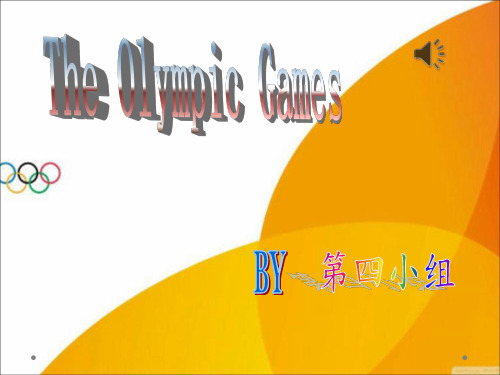
Olympic Games, international sports competition, held every four years at a different site, in which athletes from different nations compete against each other in a variety of sports. There are two types of Olympics, the Summer Olympics and the Winter Olympics.
• Summer Olympic Games in London is by far the highest number of host cities.I am pleased to invite you to LONDON, England. A capital city full of art and history. An important political centre. Each part of London has its own character. Some parts are richer than others, or more industrial, or have better housing.
London
Certainly,there are lots of Professional athletes in this game.look at these pictures.
summary
• Olympic Games is window,This is a maximum window, had been rubbed bright. Through it, those that see are worlds. Here, it is changing every day, here burgeoning thing is being replaced.It has put up platform for us , lets world know us; It has built bridge for us , lets us and world link up better. 奥林匹克比赛是窗口, 这是一个最大 窗口,是被摩擦的明亮的。 通过它, 看见的那些是世界。 这里,它每天改 变,这里发芽事被替换。它举起我们 的平台,告诉世界我们; 它修筑了我 们的桥梁,让我们和更好的世界链接。
奥运会的起源与发展_奥运会发展历史简介

奥运会的起源与发展从1896年举办首届奥运会以来,都是按照每隔4年举办一届,今年的东京奥运会因为疫情推迟了一年,你对奥运会的起源与发展了解多少呢?今天小编整理了奥运会的起源与发展供大家参考,一起来看看吧!●奥运会的起源与发展古希腊是一个神话王国,优美动人的神话故事和曲折离奇的民间传说,为古奥运会的起源蒙上一层神秘的色彩。
传说:古代奥林匹克运动会是为祭祀宙斯而定期举行的体育竞技活动。
另一种传说与宙斯的儿子赫拉克勒斯有关。
赫拉克勒斯因力大无比获"大力神"的美称。
他在伊利斯城邦完成了常人无法完成的任务,不到半天功夫便扫干净了国王堆满牛粪的牛棚,但国王不想履行赠送300头牛的许诺,赫拉克勒一气之下赶走了国王。
为了庆祝胜利,他在奥林匹克举行了运动会。
关于古奥运会起源流传最广的是佩洛普斯娶亲的故事。
古希腊伊利斯国王为了给自己的女儿挑选一个文武双全的驸马,提出应选者必须和自己比赛战车。
比赛中,先后有13个青年丧生于国王的长矛之下,而第14个青年正是宙斯的孙子和公主的心上人佩洛普斯。
在爱情的鼓舞下,他勇敢地接受了国王的挑战,终于以智取胜。
为了庆贺这一胜利,佩洛普斯与公主在奥林匹亚的宙斯庙前举行盛大的婚礼,会上安排了战车、角斗等项比赛,这就是最初的古奥运会,佩洛普斯成了古奥运会传说中的创始人。
奥运会的起源,实际上与古希腊的社会情况有着密切的关系。
公元前9-8世纪,希腊氏族社会逐步瓦解,城邦制的奴隶社会逐渐形成,建立了200多个城邦。
城邦各自为政,无统一君主,城邦之间战争不断。
为了应付战争,各城邦都积极训练士兵。
斯巴达城邦儿童从7岁起就由国家抚养,并从事体育、军事训练,过着军事生活。
战争需要士兵,士兵需要强壮身体,而体育是培养能征善战士兵的有力手段。
战争促进了希腊体育运动的开展,古奥运会的比赛项目也带有明显的军事烙印。
连续不断的战事使人民感到厌恶,普遍渴望能有一个赖以休养生息的和平环境。
后来斯巴达王和伊利斯王签订了"神圣休战月"条约。
奥运来历英文60词

As the Chinese people, we should be proud of, because the Olympic Games to be grand in our countries, so everyone is looking forward to the arrival of the Olympic Games, then let us have a better understanding of the Olympic Games it.1, the origins of the Olympic Games: Greeks in 776 BC provisions in Olympia every four years hold a Games. Until the year 394, Roman emperor was prohibited. 1875-1881, the German bank Di Wusi in the Olympic sites to explore the Archaeological Finds, has aroused worldwide interest. To this end, the French educator Pierre de Coubertin, should restore the ancient Greek tradition of the Olympic Games. So in June 1894 in Paris held its first international sports General Assembly, and in April 1896 in the Greek capital of Athens held the first modern Olympic Games.The world's most widely circulated to several Olympic rings logo, with the development of the Olympic movement, it has become a culture of the Olympic spirit and the image of representatives of the five ring "to" go, the Olympic movement to take root where flowering.Speaking of the origins of rings, we have had such an interesting story. 1936 Berlin Olympic Games of the 11th the first time held the torchrelay, the torch transmission line from Olympia, Greece from the north exit, along the Danube through Austria, the last to enter Germany. In order to heighten the symbolic significance of this activity, the Olympic Games Organizing Committee Chairman Carl •Dimu and his colleagues almost entirely in accordance with the ancient Olympic Games to the scene along the layout of the ancient Greek ruins. The torch arrived Deerfeimo SARS Hill, the ancient stadium at a special ceremony to be held and when that happens, Dimu whimsical turns, in about three feet of a high rectangular stones inscribed on all sides of the design and the modern Olympic movement rings signs, the ancient stadium on one end of the starting line. After the ceremony, the torch to the north, and the stones of this props were to remain in the ancient stadium.Since very few people know this piece of stone engraved with the five ring logo (later known as "Dimu stone") the true identity and, thereafter, for a very long time, it was as a "3,000-year-old remains of the ancient Olympic Games" . Siechuane this mistake until the 1960s才被Delphi officials pointed out that the Greek. May 1972, the relics were sent to Delphi leave another place - at the entrance to ancient Rome.In fact, the modern Olympic movement rings logo from the founder ofthe modern Olympic Games hands. Coubertin that the Olympic movement should have its own logo, the idea in his mind Panhuan a long time ago. In 1913, he finally conceptual design of the rings and white signs printed at the end of the five ring Olympic flag, the International Olympic Committee intends to set up in the 20th anniversary of the launch this logo.June 15, 1914 ~ 23, the International Olympic Committee held in France Balisuobang College behalf of the General Assembly and celebrate the 20th anniversary of the founding of the IOC. In the commemoration meeting, Coubertin happily show signs of their own design rings and rings printed a banner to demonstrate, and recommended them as a sign the Olympic movement. After listening to the five ring logo on the Coubertin note, the meeting will determine the Olympic rings and the Olympic flag as the Olympic logo.Olympic rings logo by the five Olympic ring from INTERLINKED from left to right, can be monochrome, and can also be blue, yellow, black, green and red five kinds of colors. The initial explanation is that five colors representing the color of the national flag, when it five different colors Circle interpreted as a symbol of the Cold War.Olympic flag, 3 meters long and two meters wide, with the end of white, symbolizing purity. Blue, yellow, black, green and red rings, ring interlocking. 1914, to be held in Paris for the first time, the Olympic flag has been hoisted at the Olympic. 1920, the first time the Olympic flag fluttering in Antwerp Summer Games Stadium. This session after the Games, Belgium presented the International Olympic Committee IOC same side of the flag, hoisted during the Olympic Games, after a custom, the opening ceremony of the Olympic Games host city for the last transmitted from the flag from the host city preservation, Competition During the hoisting of the main stadium only substitutes. 1952, the International Olympic Committee presented the Oslo City Winter Olympics flag, transfer, storage and use the same methods and the Summer Olympic Games.June 1979, the International Olympic Committee formally announced the flag and the meaning of rings: According to the "Olympic Charter," and the five Olympic rings banner is the meaning of: symbol of the unity of the five continents and the world athletes in a fair, frank, The competition and friendly spirit of the Olympic Games meet.。
英语日记150字HistoryoftheOlympicGames奥运会发展史
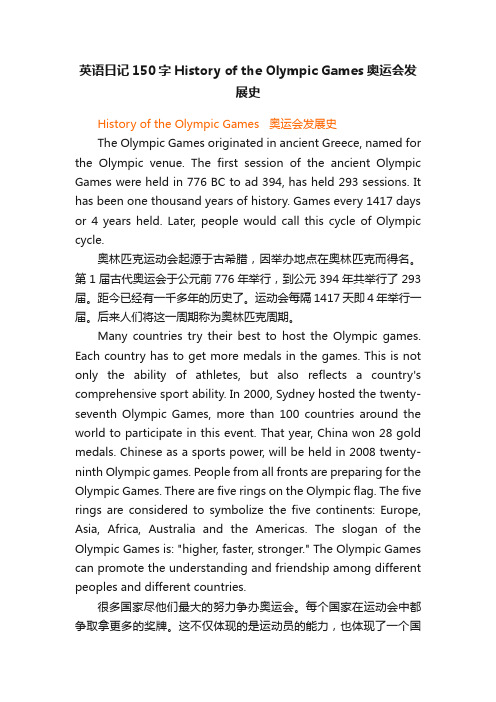
英语日记150字History of the Olympic Games奥运会发展史History of the Olympic Games 奥运会发展史The Olympic Games originated in ancient Greece, named for the Olympic venue. The first session of the ancient Olympic Games were held in 776 BC to ad 394, has held 293 sessions. It has been one thousand years of history. Games every 1417 days or 4 years held. Later, people would call this cycle of Olympic cycle.奥林匹克运动会起源于古希腊,因举办地点在奥林匹克而得名。
第1届古代奥运会于公元前776年举行,到公元394年共举行了293届。
距今已经有一千多年的历史了。
运动会每隔1417天即4年举行一届。
后来人们将这一周期称为奥林匹克周期。
Many countries try their best to host the Olympic games. Each country has to get more medals in the games. This is not only the ability of athletes, but also reflects a country's comprehensive sport ability. In 2000, Sydney hosted the twenty-seventh Olympic Games, more than 100 countries around the world to participate in this event. That year, China won 28 gold medals. Chinese as a sports power, will be held in 2008 twenty-ninth Olympic games. People from all fronts are preparing for the Olympic Games. There are five rings on the Olympic flag. The five rings are considered to symbolize the five continents: Europe, Asia, Africa, Australia and the Americas. The slogan of the Olympic Games is: "higher, faster, stronger." The Olympic Games can promote the understanding and friendship among different peoples and different countries.很多国家尽他们最大的努力争办奥运会。
奥林匹克运动会的历史(起源、发展、举办地等资料)
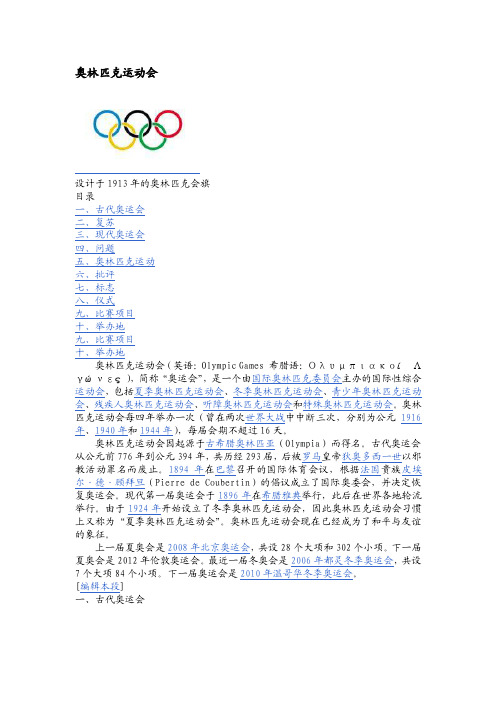
奥林匹克运动会设计于1913年的奥林匹克会旗目录一、古代奥运会二、复苏三、现代奥运会四、问题五、奥林匹克运动六、批评七、标志八、仪式九、比赛项目十、举办地九、比赛项目十、举办地奥林匹克运动会(英语:Olympic Games 希腊语:ΟλυμπιακοίΑγώνες),简称“奥运会”,是一个由国际奥林匹克委员会主办的国际性综合运动会,包括夏季奥林匹克运动会、冬季奥林匹克运动会、青少年奥林匹克运动会、残疾人奥林匹克运动会、听障奥林匹克运动会和特殊奥林匹克运动会。
奥林匹克运动会每四年举办一次(曾在两次世界大战中中断三次,分别为公元1916年、1940年和1944年),每届会期不超过16天。
奥林匹克运动会因起源于古希腊奥林匹亚(Olympia)而得名。
古代奥运会从公元前776年到公元394年,共历经293届,后被罗马皇帝狄奥多西一世以邪教活动罪名而废止。
1894年在巴黎召开的国际体育会议,根据法国贵族皮埃尔〃德〃顾拜旦(Pierre de Coubertin)的倡议成立了国际奥委会,并决定恢复奥运会。
现代第一届奥运会于1896年在希腊雅典举行,此后在世界各地轮流举行。
由于1924年开始设立了冬季奥林匹克运动会,因此奥林匹克运动会习惯上又称为“夏季奥林匹克运动会”。
奥林匹克运动会现在已经成为了和平与友谊的象征。
上一届夏奥会是2008年北京奥运会,共设28个大项和302个小项。
下一届夏奥会是2012年伦敦奥运会。
最近一届冬奥会是2006年都灵冬季奥运会,共设7个大项84个小项。
下一届奥运会是2010年温哥华冬季奥运会。
[编辑本段]一、古代奥运会奥林匹亚古竞技场参见词条:古代奥林匹克运动会希腊人于公元前776年规定每4年在奥林匹亚举办一次运动会。
运动会举行期间,全希腊选手及附近的黎民百姓相聚于奥林匹亚这个希腊南部风景秀丽的小镇。
公元前776年在这里举行第一届奥运会时,多利亚人克洛斯在192.27米短跑比赛中取得冠军,成为国际奥林匹克运动会荣获第一个项目的第一个桂冠的人。
介绍冬奥会起源的作文英文
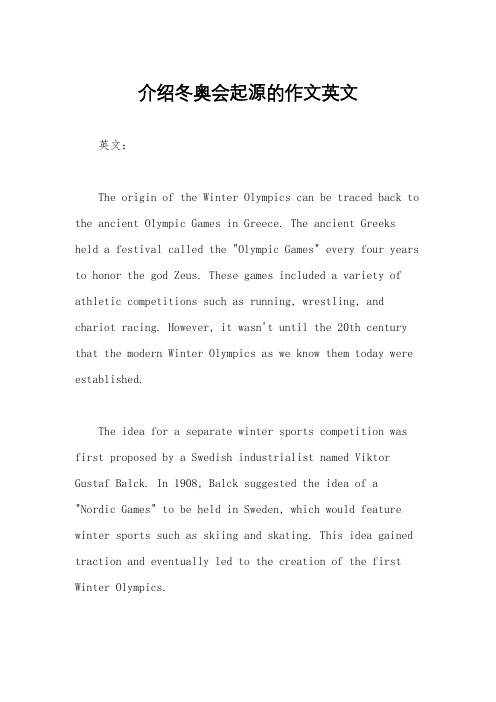
介绍冬奥会起源的作文英文英文:The origin of the Winter Olympics can be traced back to the ancient Olympic Games in Greece. The ancient Greeks held a festival called the "Olympic Games" every four years to honor the god Zeus. These games included a variety of athletic competitions such as running, wrestling, and chariot racing. However, it wasn't until the 20th century that the modern Winter Olympics as we know them today were established.The idea for a separate winter sports competition was first proposed by a Swedish industrialist named Viktor Gustaf Balck. In 1908, Balck suggested the idea of a "Nordic Games" to be held in Sweden, which would feature winter sports such as skiing and skating. This idea gained traction and eventually led to the creation of the first Winter Olympics.The first Winter Olympics were held in Chamonix, France in 1924. Athletes from 16 nations participated in a total of 16 events, including figure skating, ice hockey, and bobsleigh. The success of these games led to the establishment of the International Olympic Committee (IOC) to oversee both the Summer and Winter Games.Since then, the Winter Olympics have continued to grow and evolve, with new sports being added and more countries participating. The games have become a global event that brings people together to celebrate the spirit of competition and sportsmanship.中文:冬奥会的起源可以追溯到古希腊的奥林匹克运动会。
奥运会历史 中英双语介绍
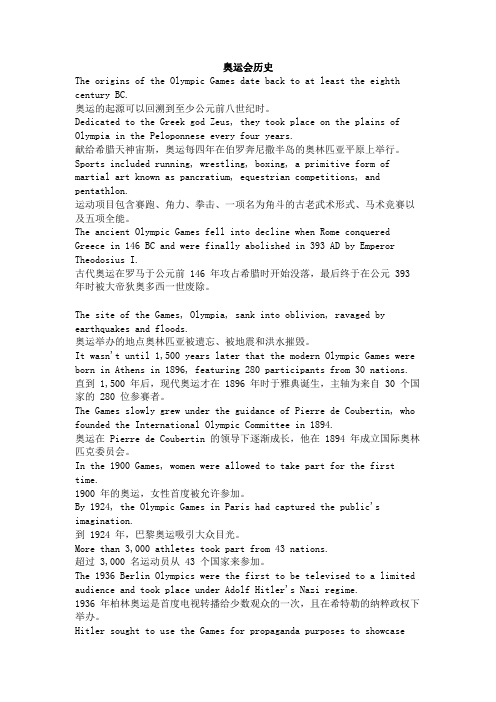
奥运会历史The origins of the Olympic Games date back to at least the eighth century BC.奥运的起源可以回溯到至少公元前八世纪时。
Dedicated to the Greek god Zeus, they took place on the plains of Olympia in the Peloponnese every four years.献给希腊天神宙斯,奥运每四年在伯罗奔尼撒半岛的奥林匹亚平原上举行。
Sports included running, wrestling, boxing, a primitive form of martial art known as pancratium, equestrian competitions, and pentathlon.运动项目包含赛跑、角力、拳击、一项名为角斗的古老武术形式、马术竞赛以及五项全能。
The ancient Olympic Games fell into decline when Rome conquered Greece in 146 BC and were finally abolished in 393 AD by Emperor Theodosius I.古代奥运在罗马于公元前 146 年攻占希腊时开始没落,最后终于在公元 393 年时被大帝狄奥多西一世废除。
The site of the Games, Olympia, sank into oblivion, ravaged by earthquakes and floods.奥运举办的地点奥林匹亚被遗忘、被地震和洪水摧毁。
It wasn't until 1,500 years later that the modern Olympic Games were born in Athens in 1896, featuring 280 participants from 30 nations. 直到 1,500 年后,现代奥运才在 1896 年时于雅典诞生,主轴为来自 30 个国家的 280 位参赛者。
奥运会渊源及中国奥运(英文演讲)PPT课件

第10届洛杉矶奥运会开幕式
第11届柏林奥运会海报 第14届伦敦奥运会海报
12
北京奥运会的理念
绿色奥运、科技奥 运和人文奥运!
Green Olympics, high-tech Olympics and people's Olympics
• 《奥林匹克宪章》指出,奥林匹克精神就是相互理解、友谊、团结
和公平竞争的精神。 understanding, friendship, solidarity and fair competition.
4
奥林匹克格言 The Olympic motto
faster, higher, stronger
Olympic committee
(ioc) special-
purposesymbol.
6
奥林匹克会旗The Olympic flag
• 白底,无边,中间是五色的奥林匹 克五环标志。
• White, limitless, middle is five-colour Olympic rings logo.
China.2008. Beijing
24
5.What's the slogan for the 2008 Olympics?
•One world, one dream
25
Thank you for your time!
26
Thank You
在别人的演说中思考,在自己的故事里成长
Thinking In Other People‘S Speeches,Growing Up In Your Own Story 讲师:XXXXXX XX年XX月XX日
英语简介奥运会历史作文
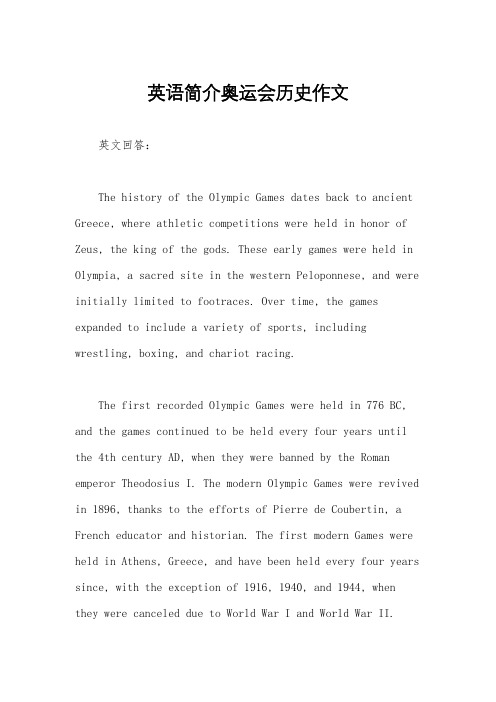
英语简介奥运会历史作文英文回答:The history of the Olympic Games dates back to ancient Greece, where athletic competitions were held in honor of Zeus, the king of the gods. These early games were held in Olympia, a sacred site in the western Peloponnese, and were initially limited to footraces. Over time, the games expanded to include a variety of sports, including wrestling, boxing, and chariot racing.The first recorded Olympic Games were held in 776 BC, and the games continued to be held every four years until the 4th century AD, when they were banned by the Roman emperor Theodosius I. The modern Olympic Games were revived in 1896, thanks to the efforts of Pierre de Coubertin, a French educator and historian. The first modern Games were held in Athens, Greece, and have been held every four years since, with the exception of 1916, 1940, and 1944, when they were canceled due to World War I and World War II.The Olympic Games have grown to become the world's largest sporting event, with athletes from over 200countries competing in over 30 sports. The Games are a celebration of human achievement and a symbol of unity and friendship among nations.Here are some interesting facts about the Olympic Games:The Olympic flame is lit in Olympia, Greece, and then carried by torchbearers to the host city.The Olympic motto is "Citius, Altius, Fortius," which means "Faster, Higher, Stronger."The Olympic rings represent the five continents of the world.The Olympic Games have been held in 28 differentcities around the world.The most successful Olympian is Michael Phelps, aswimmer from the United States, who has won 28 Olympic medals.中文回答:奥运会起源于古希腊,运动员们举行竞技比赛以向宙斯,众神之王致敬。
现代奥运会的起源与发展简介20字

现代奥运会的起源与发展简介20字现代奥运会(Modern Olympic Games)是世界上最大规模的国际体育盛事,它的起源与发展经历了一个漫长而复杂的历史过程。
本文将从奥运会的起源、发展和影响等多个方面进行介绍,以便更好地理解现代奥运会的重要性与影响。
一、奥运会的起源现代奥运会的起源可追溯到古希腊时代。
古希腊人追崇体育活动,视其为崇高的活动,并将其与宗教仪式相结合。
他们举办了奥林匹克运动会(Olympic Games),成为古代世界最重要的体育盛事之一。
然而,古代奥林匹克运动会在罗马帝国时期逐渐衰落,最终于公元4世纪停办。
二、现代奥运会的复兴现代奥运会的复兴可追溯到19世纪末的法国。
1894年,法国人巴伐利(Baron Pierre de Coubertin)提出了恢复奥运会的想法,并组织了第一届现代奥运会的国际代表大会。
大会的决议被广泛接受,并于1896年在希腊首都雅典举行了第一届现代奥运会。
这标志着现代奥运会的诞生与复兴。
三、现代奥运会的发展从第一届现代奥运会开始,它就逐渐发展成为一个具有重要国际影响的体育盛事。
第一届奥运会有来自14个国家的241名运动员参与,共举行了9个运动项目。
届时,奥运会的运动项目主要涵盖田径、摔跤、举重、击剑等传统体育项目。
随着时间的推移,奥运会的规模逐渐扩大,吸引了越来越多的国家和运动员参与。
20世纪初,足球、篮球等新兴运动逐渐成为奥运会的正式项目。
此后,游泳、体操、射击等运动项目也陆续加入。
奥运会的组织机构也逐步完善。
国际奥委会(International Olympic Committee,简称IOC)成立于1894年,负责组织和监督奥运会的运营。
国际奥委会在奥运会的发展过程中发挥了重要的作用,维护奥运会的核心价值和原则。
四、奥运会的影响现代奥运会对世界产生了深远的影响。
首先,它促进了国际交流与友谊。
奥运会为各国运动员提供了一个交流互动的平台,促进了不同文化、不同国家之间的相互理解与友谊。
关于奥林匹克运动会的历史由来-英文版
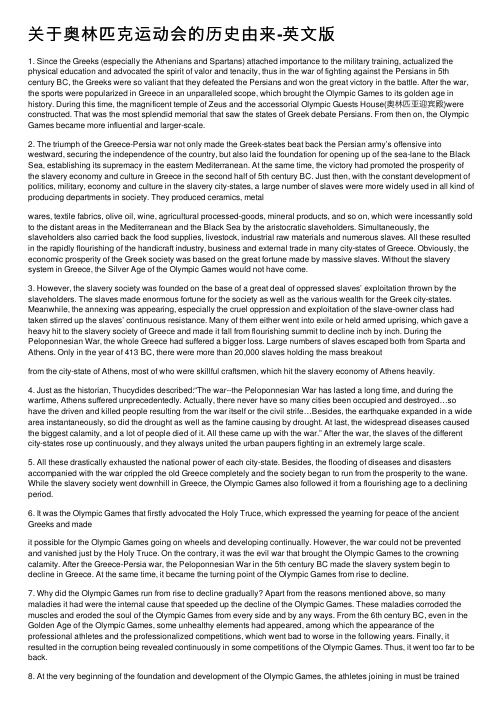
关于奥林匹克运动会的历史由来-英⽂版1. Since the Greeks (especially the Athenians and Spartans) attached importance to the military training, actualized the physical education and advocated the spirit of valor and tenacity, thus in the war of fighting against the Persians in 5th century BC, the Greeks were so valiant that they defeated the Persians and won the great victory in the battle. After the war, the sports were popularized in Greece in an unparalleled scope, which brought the Olympic Games to its golden age in history. During this time, the magnificent temple of Zeus and the accessorial Olympic Guests House(奥林匹亚迎宾殿)were constructed. That was the most splendid memorial that saw the states of Greek debate Persians. From then on, the Olympic Games became more influential and larger-scale.2. The triumph of the Greece-Persia war not only made the Greek-states beat back the Persian army’s offensive into westward, securing the independence of the country, but also laid the foundation for opening up of the sea-lane to the Black Sea, establishing its supremacy in the eastern Mediterranean. At the same time, the victory had promoted the prosperity of the slavery economy and culture in Greece in the second half of 5th century BC. Just then, with the constant development of politics, military, economy and culture in the slavery city-states, a large number of slaves were more widely used in all kind of producing departments in society. They produced ceramics, metalwares, textile fabrics, olive oil, wine, agricultural processed-goods, mineral products, and so on, which were incessantly sold to the distant areas in the Mediterranean and the Black Sea by the aristocratic slaveholders. Simultaneously, the slaveholders also carried back the food supplies, livestock, industrial raw materials and numerous slaves. All these resulted in the rapidly flourishing of the handicraft industry, business and external trade in many city-states of Greece. Obviously, the economic prosperity of the Greek society was based on the great fortune made by massive slaves. Without the slavery system in Greece, the Silver Age of the Olympic Games would not have come.3. However, the slavery society was founded on the base of a great deal of oppressed slaves’ exploitation thrown by the slaveholders. The slaves made enormous fortune for the society as well as the various wealth for the Greek city-states. Meanwhile, the annexing was appearing, especially the cruel oppression and exploitation of the slave-owner class had taken stirred up the slaves’ continuous resistance. Many of them either went into exile or held armed uprising, which gave a heavy hit to the slavery society of Greece and made it fall from flourishing summit to decline inch by inch. During the Peloponnesian War, the whole Greece had suffered a bigger loss. Large numbers of slaves escaped both from Sparta and Athens. Only in the year of 413 BC, there were more than 20,000 slaves holding the mass breakoutfrom the city-state of Athens, most of who were skillful craftsmen, which hit the slavery economy of Athens heavily.4. Just as the historian, Thucydides described:“The war--the Peloponnesian War has lasted a long time, and during the wartime, Athens suffered unprecedentedly. Actually, there never have so many cities been occupied and destroyed…so have the driven and killed people resulting from the war itself or the civil strife…Besides, the earthquake expanded in a wide area instantaneously, so did the drought as well as the famine causing by drought. At last, the widespread diseases caused the biggest calamity, and a lot of people died of it. All these came up with the war.” After the war, the slaves of the different city-states rose up continuously, and they always united the urban paupers fighting in an extremely large scale.5. All these drastically exhausted the national power of each city-state. Besides, the flooding of diseases and disasters accompanied with the war crippled the old Greece completely and the society began to run from the prosperity to the wane. While the slavery society went downhill in Greece, the Olympic Games also followed it from a flourishing age to a declining period.6. It was the Olympic Games that firstly advocated the Holy Truce, which expressed the yearning for peace of the ancient Greeks and madeit possible for the Olympic Games going on wheels and developing continually. However, the war could not be prevented and vanished just by the Holy Truce. On the contrary, it was the evil war that brought the Olympic Games to the crowning calamity. After the Greece-Persia war, the Peloponnesian War in the 5th century BC made the slavery system begin to decline in Greece. At the same time, it became the turning point of the Olympic Games from rise to decline.7. Why did the Olympic Games run from rise to decline gradually? Apart from the reasons mentioned above, so many maladies it had were the internal cause that speeded up the decline of the Olympic Games. These maladies corroded the muscles and eroded the soul of the Olympic Games from every side and by any ways. From the 6th century BC, even in the Golden Age of the Olympic Games, some unhealthy elements had appeared, among which the appearance of the professional athletes and the professionalized competitions, which went bad to worse in the following years. Finally, it resulted in the corruption being revealed continuously in some competitions of the Olympic Games. Thus, it went too far to be back.8. At the very beginning of the foundation and development of the Olympic Games, the athletes joining in must be trainedstrictly. Once winning in the competition, they would gain all kinds of glories after that. At first, the kings, slaveholders and aristocrats often participated insome competitions. Relatively, the slaveholders and aristocrats usually paid special attention to the strict and hard training and spared no effort in the games. But the following games were imprinted by the ages deeply along with the slavery society going from prosperity to decline in Greece.。
希腊雅典历史之奥林匹亚运动会的起源_中英对照版

希腊雅典历史之奥林匹亚运动会的起源The Origin of the Olympic Games in Ancient Athens,GreeceThe cradle of civilization is often traced back to ancient Greece, a land that birthed not only profound philosophical ideas but also the world-renowned Olympic Games. These two seemingly disparate entities are intimately intertwined in Greek history and culture, forming a unique narrative that continues to resonate across time.追溯文明的摇篮,我们总会回到古希腊——这片孕育了深刻哲学思想和举世闻名的奥林匹克运动会的土地。
在希腊的历史与文化中,这两者似乎截然不同却又紧密相连,构成了一段独特的叙事,经久不衰地回响着。
Deep within the heart of ancient Athens, nestled among rolling hills and lush greenery, was the sacred site known as Olympia. It was here where the first rays of dawn would greet the rising sun, casting its golden glow upon the altars and temples dedicated to the gods. This serene setting provided the perfect backdrop for what would become one of the most enduring symbols of human unity - the Olympic Games.古雅典的心脏深处,有一片位于连绵起伏的山丘和郁郁葱葱的绿地之中的神圣之地——奥林匹亚。
奥运会历史中英双语介绍

奥运会历史中英双语介绍奥运会,又称奥林匹克运动会,是一个每四年举办一次的国际综合性体育赛事。
来自世界各地的运动员参加各种体育比赛,争夺金牌、银牌和铜牌。
让我们来看一下奥运会的历史吧。
古代奥林匹克运动会起源于古希腊,于公元前776年首次举行。
这些比赛是为了庆祝希腊神祇宙斯的一个宗教节日,并且在奥林匹亚城举办。
来自不同城邦的运动员会参加各种项目,如赛跑、跳远、铁饼和标枪投掷,以及战车比赛。
古代奥林匹克运动会每四年举办一次,持续五天。
它们是希腊城邦之间团结的象征,并提供了解决冲突的一种方式。
这些比赛只对自由出身的希腊男子开放,女性和奴隶不允许参加比赛,甚至不被允许作为观众参观。
The ancient Olympic Games continued until 393 AD, when the Roman Emperor Theodosius I abolished them as part of the suppression of pagan rituals. For over a millennium, the Olympic Games faded into history.古代奥林匹克运动会一直延续到公元393年,当时罗马皇帝提奥多修斯一世废除了它们作为对异教仪式的镇压的一部分。
千余年来,奥林匹克运动会消失在历史的长河中。
奥运会再度复兴的想法是由法国教育家和历史学家皮埃尔·德·顾拜旦提出的。
他希望通过体育促进和平和国际理解。
1896年,第一届现代奥林匹克运动会在希腊雅典举行,来自14个国家的运动员参加了43个项目的比赛。
自那时以来,奥运会每隔四年举行一次,除了在世界大战期间中断。
这些运动会在多年间发生了很大的变化,增加了新的项目,并对比赛进行了改变,以适应越来越多的参赛国家和运动员。
奥运会已经成为一个全球性的赛事,来自200多个国家的运动员参加各种体育比赛。
这些比赛是运动员展示自己技能和为自己的国家带来自豪感的平台。
奥运会历史发展历程与意义作文
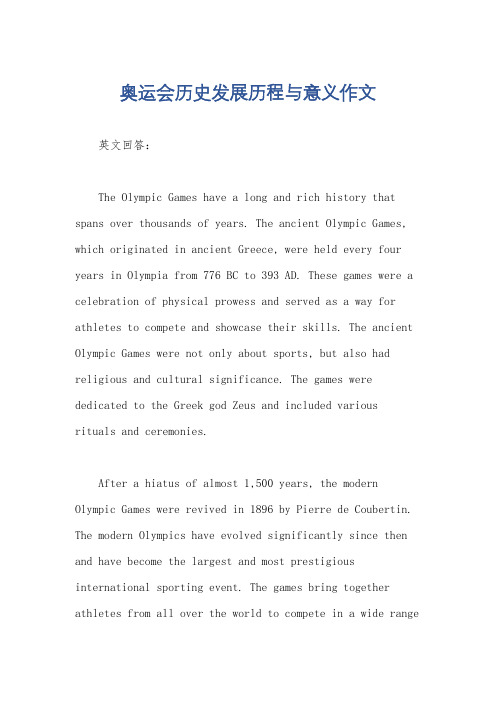
奥运会历史发展历程与意义作文英文回答:The Olympic Games have a long and rich history that spans over thousands of years. The ancient Olympic Games, which originated in ancient Greece, were held every four years in Olympia from 776 BC to 393 AD. These games were a celebration of physical prowess and served as a way for athletes to compete and showcase their skills. The ancient Olympic Games were not only about sports, but also had religious and cultural significance. The games were dedicated to the Greek god Zeus and included variousrituals and ceremonies.After a hiatus of almost 1,500 years, the modern Olympic Games were revived in 1896 by Pierre de Coubertin. The modern Olympics have evolved significantly since then and have become the largest and most prestigious international sporting event. The games bring together athletes from all over the world to compete in a wide rangeof sports and disciplines. The Olympic Games have also become a platform for countries to showcase their national pride and unity.The Olympic Games hold great significance and have a profound impact on both individuals and nations. For athletes, the Olympics represent the pinnacle of their sporting careers. It is a dream for many athletes to participate in the games and win a medal. The Olympics provide them with an opportunity to test their skills against the best in the world and achieve personal glory. The games also promote values such as fair play, sportsmanship, and unity among athletes.For nations, the Olympic Games serve as a platform to promote their cultural heritage and showcase their achievements. Hosting the Olympics is a matter of great pride for a country and can have significant economic and infrastructural benefits. The games bring international attention and attract tourists, which can boost the local economy. The Olympics also provide an opportunity for countries to come together and foster diplomatic relations.In addition to the athletic and cultural aspects, the Olympic Games also have a significant impact on society.The games inspire people of all ages to engage in physical activity and lead a healthy lifestyle. They serve as a source of motivation and inspiration for individuals to pursue their goals and overcome challenges. The Olympicsalso promote inclusivity and diversity, as they bring together people from different backgrounds and cultures.中文回答:奥运会有着悠久而丰富的历史,跨越了数千年。
冬奥的发展及由来英文作文

冬奥的发展及由来英文作文The Winter Olympics: A Celebration of Winter Sports and Global Unity。
The Winter Olympics, a quadrennial international multi-sport event, has a rich and captivating history that dates back to the early 20th century. This prestigiouscompetition showcases the world's most talented winter athletes, who captivate audiences with their exceptional skills, daring feats, and unwavering determination.The origins of the Winter Olympics can be traced backto the 1920s, when the International Olympic Committee (IOC) recognized the growing popularity of winter sports and the need for a dedicated event to celebrate them. The first Winter Olympics were held in 1924 in Chamonix, France, featuring a total of 16 events across 6 sports. This inaugural event was a resounding success, attractingathletes from 16 nations and capturing the imagination of the global audience.Over the years, the Winter Olympics have evolved and expanded, reflecting the dynamic nature of winter sportsand the changing interests of the international community. The number of events has steadily increased, with the addition of new disciplines such as freestyle skiing, snowboarding, and biathlon, among others. The Winter Olympics have also become a platform for technological advancements, with athletes and organizers constantly pushing the boundaries of innovation to enhance performance and the spectator experience.One of the most remarkable aspects of the Winter Olympics is its ability to bring together people from diverse backgrounds, cultures, and nations. The eventserves as a powerful symbol of global unity, fostering a spirit of camaraderie and sportsmanship among the participating athletes. The Olympic values of excellence, friendship, and respect are at the heart of the Winter Games, inspiring athletes and spectators alike to transcend their differences and celebrate the shared human experience.The Winter Olympics have also played a significant role in the development and promotion of winter sports worldwide. Host cities have invested heavily in building state-of-the-art facilities and infrastructure, creating opportunitiesfor local communities to engage in and enjoy thesethrilling activities. The exposure and media coverage generated by the event have also helped to popularizewinter sports, inspiring a new generation of athletes and enthusiasts to take up these challenging and exhilarating pursuits.Moreover, the Winter Olympics have had a profoundimpact on the host cities and countries, serving as a catalyst for economic growth, urban development, andcultural exchange. The influx of visitors, the construction of new facilities, and the global attention generated bythe event have often led to significant investments in infrastructure, tourism, and local industries. This, in turn, has created employment opportunities, boosted local economies, and showcased the host nations' cultural and natural wonders to the world.Despite the challenges posed by the COVID-19 pandemic, the 2022 Winter Olympics in Beijing, China, were a resounding success, demonstrating the resilience and adaptability of the event. The organizers implementedstrict health and safety protocols to ensure the safety of the athletes, officials, and spectators, while still delivering a captivating and memorable experience for all.As we look to the future, the Winter Olympics continue to evolve and adapt to the changing landscape of winter sports and global trends. The incorporation of new events, the advancement of technology, and the ongoing commitment to sustainability and environmental responsibility will undoubtedly shape the future of this iconic event.In conclusion, the Winter Olympics stand as a testament to the human spirit, showcasing the incredible feats of athleticism, the power of global unity, and the enduring legacy of winter sports. As the world eagerly awaits the next edition of this prestigious competition, the Winter Olympics will continue to captivate and inspire audiencesworldwide, solidifying its place as one of the most celebrated and revered sporting events in the world.。
介绍冬奥会起源的英语作文
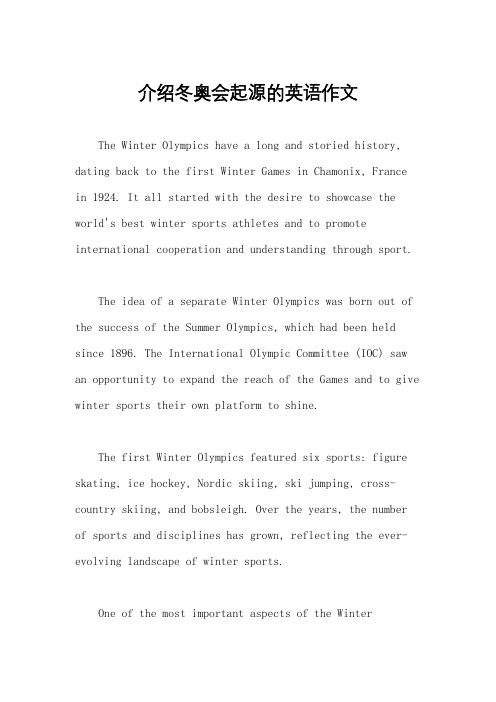
介绍冬奥会起源的英语作文The Winter Olympics have a long and storied history, dating back to the first Winter Games in Chamonix, Francein 1924. It all started with the desire to showcase the world's best winter sports athletes and to promote international cooperation and understanding through sport.The idea of a separate Winter Olympics was born out of the success of the Summer Olympics, which had been held since 1896. The International Olympic Committee (IOC) saw an opportunity to expand the reach of the Games and to give winter sports their own platform to shine.The first Winter Olympics featured six sports: figure skating, ice hockey, Nordic skiing, ski jumping, cross-country skiing, and bobsleigh. Over the years, the number of sports and disciplines has grown, reflecting the ever-evolving landscape of winter sports.One of the most important aspects of the WinterOlympics is the sense of unity and camaraderie that it fosters among nations. Athletes from all over the world come together to compete, but also to celebrate the spirit of sportsmanship and fair play.The Winter Olympics have also been a driving force behind the development of winter sports infrastructure and technology. Host cities have had to innovate and invest in new facilities and equipment to meet the demands of the Games, leaving a lasting legacy for the local communities.In conclusion, the Winter Olympics have come a long way since their humble beginnings in 1924. They have grown into a global phenomenon that brings people together, showcases the best of winter sports, and leaves a lasting impact on host cities.。
- 1、下载文档前请自行甄别文档内容的完整性,平台不提供额外的编辑、内容补充、找答案等附加服务。
- 2、"仅部分预览"的文档,不可在线预览部分如存在完整性等问题,可反馈申请退款(可完整预览的文档不适用该条件!)。
- 3、如文档侵犯您的权益,请联系客服反馈,我们会尽快为您处理(人工客服工作时间:9:00-18:30)。
During the Olympics a “sacred truce神圣休战” and not use all weapons(武器), to wage war(发动战争). It created civilization(文明), and equality of wealth, has gone far beyond the significance(意义) of sport itself, known as the ancient Olympic sports culture.
In June 1894, in French educator, historians Pierre DE coubertin baron (皮埃尔· 顾拜旦男爵)tireless 德· efforts of the international Olympic committee(国际 奥林匹克委员会) was established(成立), and through the first Olympic charter(奥林匹克章程).
1894年6月,在法国教育家、历史学家皮埃尔· 顾拜旦男爵的不懈努力下,国 德· 际奥林匹克委员会成立,并通过了第一部奥林匹克章程。
In 1896, in Athens(雅典), Greece held the first modern Olympic Games. Since then a world of sports was born, and also produced a new kind of global, unified (统一的) sports and cultural patterns.
从公元前776年开始,表演以比赛的形式出现,人们把这一年当作古代奥林匹 克运动会的开始。除了娱神之外,当时的运动娱乐活动还通过人体运动技能的 展示,为社会各阶层提供不同需求的精神满足。其内容有自娱、娱官、娱人等。
From 776 BC to 394 AD, the ancient Olympic Games every four years organized session, held a total of 293 sessions.
它跨越了民族文化的鸿沟,完成了人类运动文化史上的质变,成为独具特色的 现代奥林匹克运动文化。
THANK YOU
现代奥林匹克运动文化起源于西方,流行于全世界,并已成为人类共享 的精神文明成果。
The time of (……的时代)ancient Greece Olympia village is “god city”(神城), where leaders of Zeus (诸神领袖宙斯 )built the temple gods. Each year the city to this ritual activities(祭祀活 动) (entertainment gods activities娱神活动).
奥运会期间实行“神圣休战”,所有人不得运用武器,发动战争。它所创造的 文明、和平等财富,已远远超出体育运动本身的意义,被称作古代奥林匹克运 动文化。
Medieval theological rule(中世纪神学统治时代), the Olympic sports culture almost completely eliminated (消除)until the Renaissance(文艺复兴时期), the theology was replaced by people-oriented culture of humanism. New humanistic values established(建立), the sport has entered a new stage of development.
1896年,在希腊雅典举行了第一届现代奥林匹克运动会。从此一种世界性的体育 活动诞生了,同时产生了一种新的世界性Байду номын сангаас、统一的体育文化形态。
It crossed the culture divide, the completion of the human cultural history of the sport qualitative change and became unique culture of the modern Olympic movement.
The modern Olympic movement originated in western culture, and became popular all over the world, and has become the spiritual civilization of mankind (人类精神文明)to share results.
中世纪神学统治时期,奥林匹克运动文化几乎湮灭殆尽,直到文艺复兴时期,神 学文化被以人为本的人文主义所取代。新的人文价值观的确立,使体育运动进入 了崭新的发展阶段。
皮埃尔· 顾拜旦 德·
现代奥林匹克运动会的发 起人,1896年至1925年任 国际奥林匹克委员会主席, 奥林匹克会徽、奥林匹克 会旗设计者。他终生倡导 奥林匹克精神,被誉为 “现代奥林匹克之父”。 顾拜旦不仅是国际体育活 动家,同时也是卓有成就 的教育学家和历史学家。
奥林匹亚村是古希腊时代的“神城”,那里建有诸神领袖宙斯的神庙。每 年各城邦都要来此举行祭祀活动(娱神活动)。
From 776 BC, performing in the form of a competition, people this year as the beginning of the ancient Olympic Games. Apart from the entertainment god besides, then through sports entertainment display of the human body movement skills, to provide different social strata(社会阶层) of the spirit to meet demand. Its contents are self-entertainment, entertainment officer, entertainment, etc.
